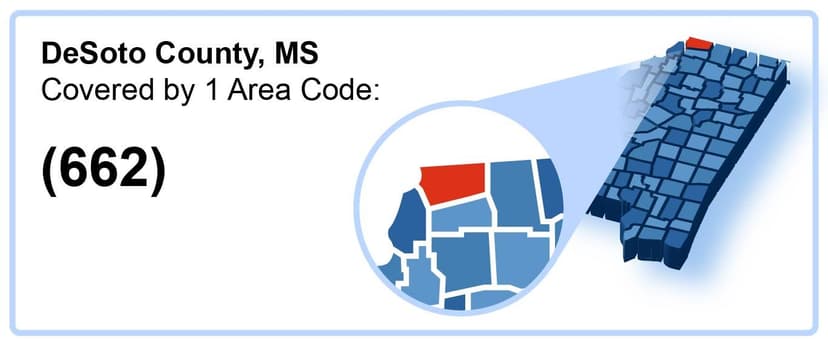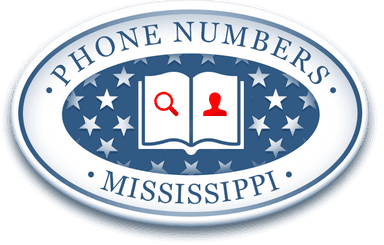What are DeSoto County Area Codes?

Area codes were introduced by the North American Numbering Plan (NANP) in 1947 to simplify the process of long-distance telephone communication. They are a set of three-digit numbers that start North American Telephone Numbers. A geographical region covered by an area code is called a Numbering Plan Area (NPA). The North American Numbering Plan Administrator (NANPA) provides area code lookups online. Mississippi area codes are managed and implemented by the Mississippi Public Service Commission.
There is currently only one area code covering DeSoto County.
Area Code 662
Area code 662 covers all the five cities in DeSoto County. It was split from the 601 NPA in 1999 and put into service the same year. Cities and towns in DeSoto County within area code 662 include Hernando City, Horn Lake City, Olive Branch City, Southaven City, and Walls Town.
What are the Best Cell Phone Plans in DeSoto County?
The survey carried out in 2019 by the National Center of Health Statistics revealed that about 66.5% of adults in Mississippi had adopted wireless-only telephony services. Those that still used landline phones accounted for 3.0% of the adult population. The survey confirmed DeSoto County residents’ preference for wireless telephony over landlines.
The phone carriers with the best cell phone plans in DeSoto County are Verizon, AT&T, T-Mobile, and Sprint. Among these four, AT&T has the best network coverage at 98.75%, while Verizon follows closely with about 98.23% spread. Sprint offers coverage of 95.25%, while T-Mobile covers 75.16% of the county.
Voice Over Internet Protocol (VoIP) offers DeSoto County residents more affordable telephony means using broadband internet connections. It allows them to make calls from computers, landline phones connected to adapters, and specialized VoIP phones. VoIP users can make calls to phone numbers outside their area codes at relatively cheaper rates compared to regular phone services.
What are DeSoto County Phone Scams?
In DeSoto County, phone scams are deceptive activities over the phone targeted at defrauding county residents. Phone scammers typically aim to extort money and obtain information from unsuspecting residents. They usually commit identity and financial theft using the information obtained from scam victims.
The DeSoto County Sheriff's Office, Better Business Bureau, Federal Trade Commission (FTC), and the Consumer Financial Protection Bureau protect DeSoto County residents from scams. Residents may file reports of fraudulent phone calls or actual frauds with any of these agencies. Reverse phone lookup services can help residents identify fraudulent phone calls or text messages and prevent them from becoming scam victims. Some of the most common phone scams in DeSoto County include:
What are Business Scams?
Callers defraud DeSoto County residents by promising to help them set up their businesses. They offer business coaching and investment opportunities that will allegedly yield high returns with very minimal risks. Usually, targeted residents only discover that these offers never existed after they might have been duped. In some cases, their investments will yield insignificant returns.
To avoid being identified by their targets, these scammers often spoof their phone numbers to make them look like reputable organizations. They claim to be representatives of notable companies to deceive their marks and appear more convincing. Residents of DeSoto County must remain updated about these phone scams to avoid falling prey to them. The FTC provides the Businesses Opportunity Rule on its website to educate residents on how to avoid business scams. Residents may conduct free phone number lookups by name to answer the question "who called?"
What are Charity Scams
In charity scams, fraudsters contact DeSoto County residents via phone pretending to be with familiar charity organizations. They then solicit donations for charitable causes like disaster relief materials and care for orphanage homes. DeSoto County residents should always verify with charity organizations before making contributions. They can also research such charities to ascertain if their donations will be tax-deductible. Doing this will help them determine what part of their money will go into the charity program they want to support.
Also, residents can check out charity organizations’ websites to see if they can find enough information about their program, mission, and objectives. If their website does not provide sufficient information about their activities, it may signal a red flag. To avoid falling victim to charity scams, residents can leverage free reverse phone lookup services to conduct phone number searches and verify who called.
What are Prize Scams?
In prize scams, the callers typically inform their targets that they have won or are close to winning certain prizes but must pay specific fees to secure them. When presented with these claims, DeSoto County residents should know that it is illegal to pay money to increase their chances of winning prizes. Telemarketers are required by law to disclose material information that would otherwise affect an individual's decision to participate in an event or make a charitable contribution. As a result, they are legally required to reveal the terms and conditions to win prizes and the residents' chances of winning. It is essential to state that legitimate prize giveaways will not need individuals to pay any participation fee. Phone number search applications can help residents uncover the identities of these callers and help them avoid prize scams.
What are IRS Impersonation Scams?
Fraudsters contact unsuspecting DeSoto County residents and convince them into paying delinquent taxes to the wrong quarters. They often claim to be officials of the Internal Revenue Service (IRS) and usually threaten targets with legal actions if they fail to pay immediately. Some of these fraudsters also try to trick residents into disclosing confidential information that they can use to perpetrate further theft. These scammers usually spoof their targets’ Caller IDs to appear like calls from the IRS and sometimes use real badge numbers to fool residents. They ask for payments via wire transfers or gift cards. It is common for them to target vulnerable residents. Their favorite marks are non-English immigrants, senior residents, and new residents who are not acquainted with the tax system.
The IRS advises residents to be more careful with unknown callers to prevent falling victim to IRS scams. They provided guidelines to identify IRS phone scams to help residents in this regard. Residents who suspect fraudulent phone calls relating to taxes may call the IRS for verifications. They can also maximize the services of reverse phone number lookup applications to ascertain such callers’ identities.
What are Travel Scams?
In travel scams, fraudsters take advantage of the residents' desire for vacation to scam them. These scammers often offer targeted residents travel packages at discounted rates in a bid to extort them. They usually require targets to pay specific amounts of money to grant them access to travel clubs. Another trick used by these scammers is to inform the targets that they were selected for free vacations but must pay some money to receive the details. They usually coerce their victims into making payments promptly, so no one else takes their slots. During the telephone engagement, the fraudsters may attempt to obtain some personal information for eventual identity theft. With any good reverse phone lookup application, residents can find out these callers’ identities and avoid falling prey to travel scams.
What are Robocalls and Spam Calls?
Robocalls are calls that deliver pre recorded messages using auto dialers. They can reach millions of people daily. Most robocalls are configured to guide the response of the recipients by instructing them to make specific inputs based on the options available. Several legitimate robocalls convey information such as flight cancellations and appointment reminders to the recipients. Most robocalls, however, are created to sell something to a mass audience. Telemarketers, political campaign organizations, and the government use robocalls to convey their messages to the residents of DeSoto County. Billions of robocalls are made worldwide every month, and most recipients perceive them as a nuisance. Technology has made robocalls easy, so scammers take advantage of robocalls to perpetrate fraud.
Spam calls are made to steal money or personal information over the phone. They usually come in the form of mass phone calls and are typically irrelevant. Robocalls are a type of spam call. Scammers favor spoofing robocalls to impersonate reputable entities while preying on their targets. Reverse cell phone lookup services can help residents identify robocalls and avoid robocall scams. To reduce the risk of falling prey to robocall scams, here are some recommendations for residents:
- If a robocall comes in without your express permission, end the call. As a general rule, do not risk taking those calls as they eventually lead to further prompts that may defraud you.
- Download and activate a third-party call-blocking application to block unwanted calls.
- Add your phone number on the FTC’s National Do Not Call Registry, and Mississippi No Call List. These registries prevent registered phone numbers from getting telemarketers’ robocalls, which minimizes the possibility of receiving robocall scams.
- Run unknown phone numbers in incoming calls through phone number lookup applications to ascertain if they are robocalls or live calls.
How Can You Spot and Report DeSoto County Phone Scams?
Phone scams may come in many forms but are somewhat similar in their operations. They tend to make similar threats and promises or require payment in specific ways. Desoto County residents can reduce the chances of falling victim to phone scams by identifying them before being cheated. Reverse phone number lookup tools can retrieve identifying information on unknown callers and help residents ascertain if they are who they claim to represent. They are also encouraged to report suspected phone scams to the relevant authorities. Common signs of DeSoto County phone scams include:
- The caller makes an aggressive attempt to get the recipient to succumb to their demands.
- The caller asks for confidential information such as debit or credit card details. Legitimate entities do not request such over the phone.
- The caller insists on a specific mode of payment. Transactions are often difficult to trace on their preferred payment channels (cryptocurrency, gift cards, or wire transfers).
DeSoto County residents can report phone scam incidents to any of the following agencies:
Consumer Financial Protection Bureau - The Consumer Financial Protection Bureau educates residents about financial intelligence and provides them with the resources to protect their finances. Phone scam victims may contact the Financial Protection Bureau by calling (855) 411-2372.
Better Business Bureau - The Better Business Bureau provides a platform for individuals to report businesses and offers suspected to be fraudulent. Individuals may file the report through the online scam tracker available on the bureaus’ official website.
Federal Trade Commission - Using the FTC online portal, DeSoto County residents may report their encounters from phone scam incidents. The commission also provides the National Do Not Call Registry to protect residents from receiving illegal robocalls.
DeSoto County Sheriff's Department - Phone scam victims in DeSoto County can file reports with the DeSoto County Sheriff's Department by calling (662) 469-8500.
